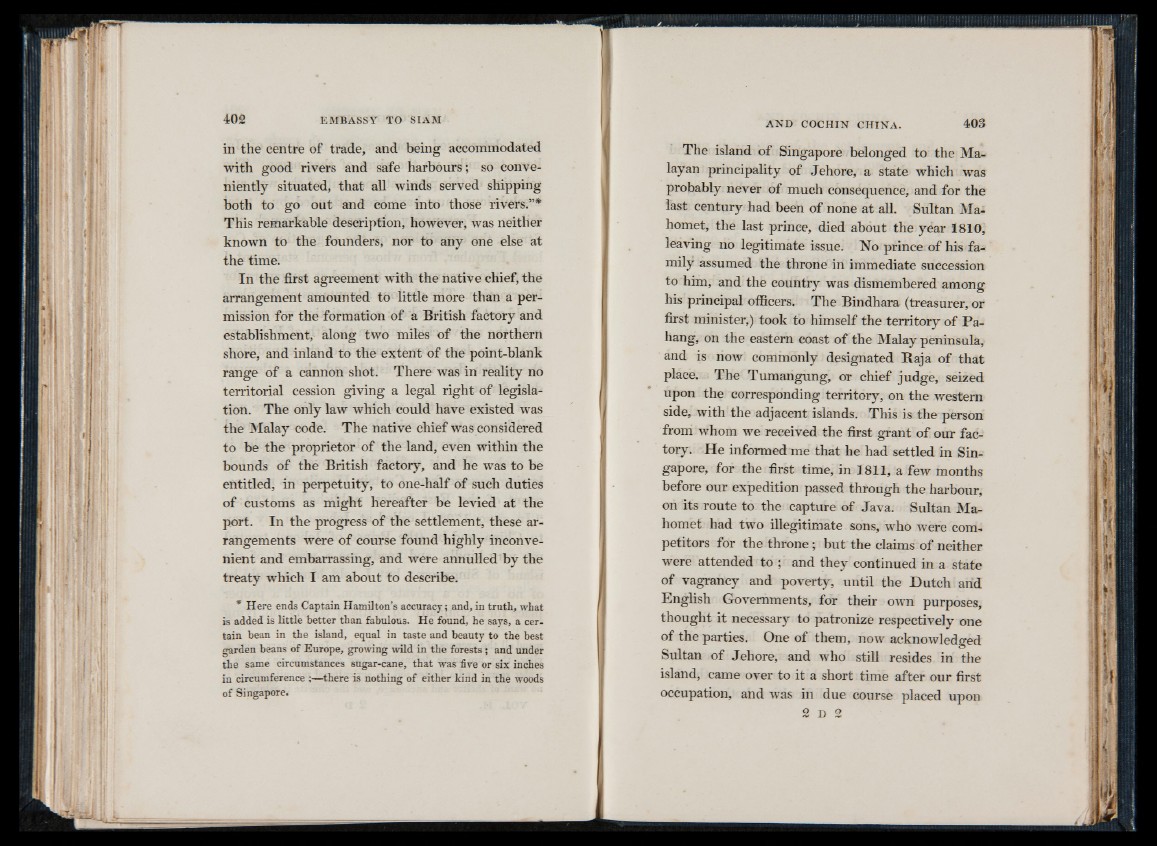
in the centre of trade, and being accommodated
with good rivers and safe harbours; so conveniently
situated, that all winds served shipping
both to go out and come into those rivers.”*
This remarkable description, however, was neither
known to the founders, nor to any one else at
the time.
In the first agreement with the native chief, the
arrangement amounted to little more than a permission
for the formation of a British factory and
establishment, along two miles of the northern
shore, and inland to the extent of the point-blank
range of a cannon shot. There was in reality no
territorial cession giving a legal right of legislation.
The only law which could have existed was
the Malay code. The native chief was considered
to be the proprietor of the land, even within the
bounds of the British factory, and he was to be
entitled, in perpetuity, to one-half of such duties
of customs as might hereafter be levied at the
port. In the progress of the settlement, these arrangements
were of course found highly inconvenient
and embarrassing, and were annulled by the
treaty which I am about to describe.
* Here ends Captain Hamilton’s accuracy; and, in truth, what
is added is little better than fabulous. He found, he says, a certain
bean in the island, equal in taste and beauty to the best
garden beans of Europe, growing wild in the forests; and under
the same circumstances sugar-cane, that was five or six inches
in circumference ;—there is nothing of either kind in the woods
of Singapore.
The island of Singapore belonged to the Malayan
principality of Jehore, a state which was
probably never of much consequence, and for the
last century had been of none at all. Sultan Mahomet,
the last prince, died about the year 1810,
leaving no legitimate issue. No prince of his family
assumed the throne in immediate succession
to him, and the country was dismembered among
his principal officers. The Bindhara (treasurer, or
first minister,) took to himself the territory of Pa-
hang, on the eastern coast of the Malay peninsula,
and is now commonly designated Raja of that
place. The Tumangung, or chief judge, seized
upon the corresponding territory, on the western
side, with the adjacent islands. This is the person
from whom we received the first grant of our factory.
He informed me that he had settled in Singapore,
for the first time, in 1811, a few months
before our expedition passed through the harbour,
on its route to the capture of Java. Sultan Mahomet
had two illegitimate sons, who were competitors
for the throne; but the claims of neither
were attended to ; and they continued in a state
of vagrancy and poverty, until the Dutch and
English Governments, for their own purposes,
thought it necessary to patronize respectively one
of the parties. One of them, now acknowledoged
Sultan of Jehore, and who still resides in the
island, came over to it a short time after our first
occupation, and was in due course placed upon
2 D 2